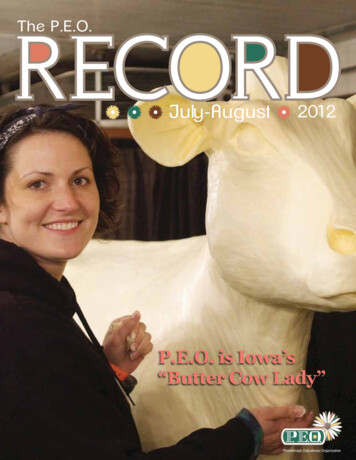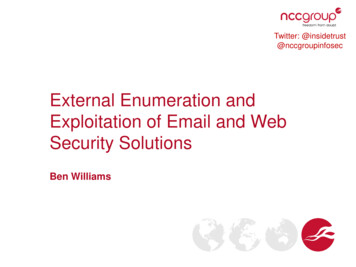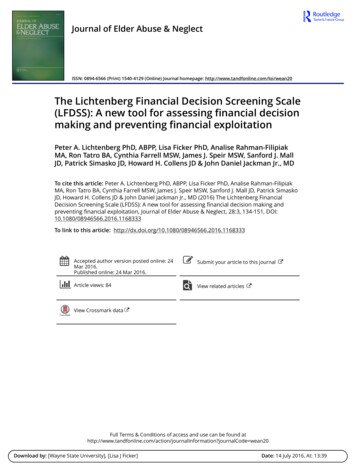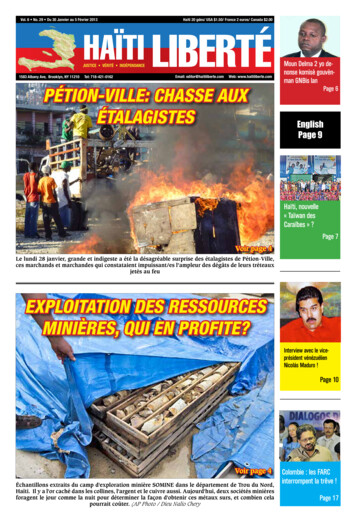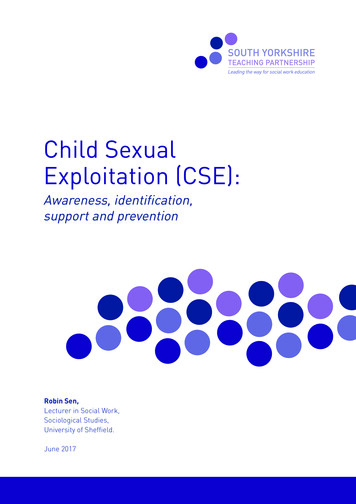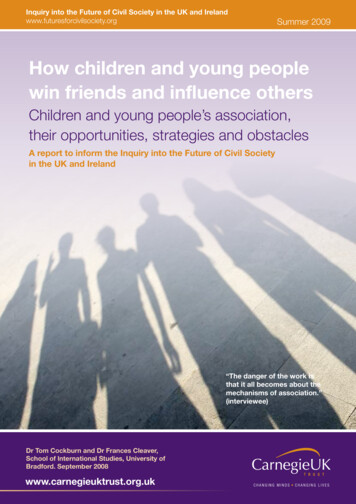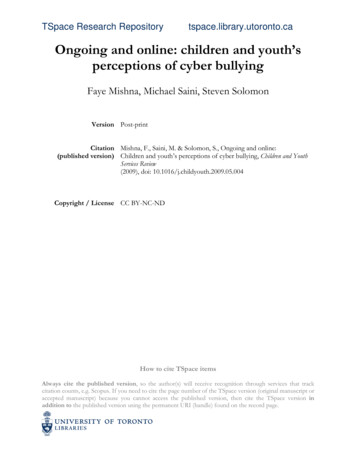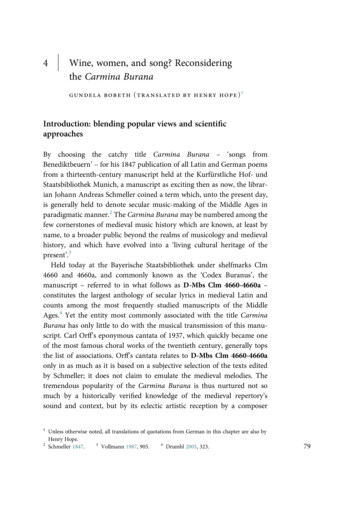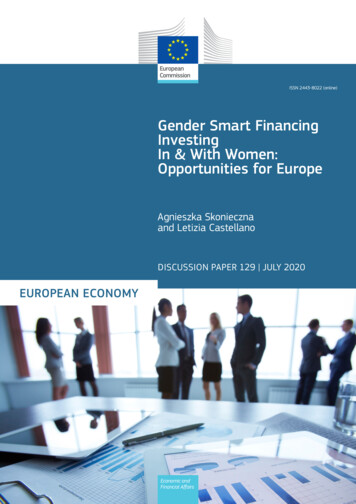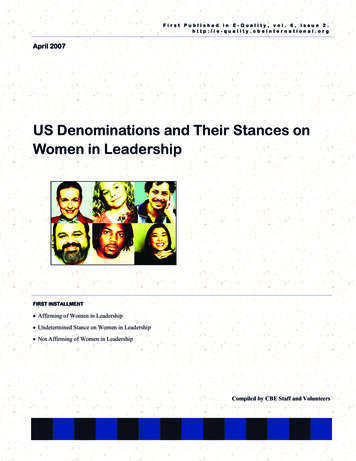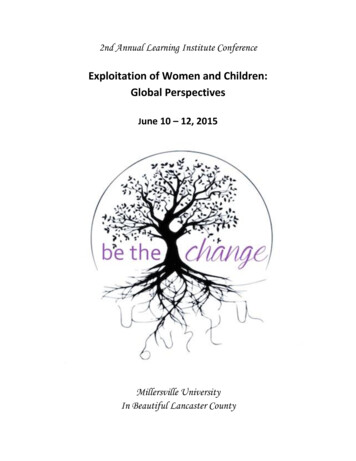
Transcription
2nd Annual Learning Institute ConferenceExploitation of Women and Children:Global PerspectivesJune 10 – 12, 2015Millersville UniversityIn Beautiful Lancaster County
Welcome to the2nd Annual Learning Institute ConferenceExploitation of Women and Children:Global PerspectivesJune 10-12, 2015The Ware CenterLancaster, PennsylvaniaHosted byMillersville UniversityDepartment of Social WorkEnjoy the conference and your stay in scenic, historic,Lancaster County, Pennsylvania!
MILLERSVILLE UNIVERSITYDEPARTMENT OF SOCIAL WORKDr. Joyous BethelMs. Kristin CallawayMs. Beth ColvinMs. Lauren CorsoDr. Marc FelizziProfessor Jennifer FrankDr. Leonora Foels, Conference Co-CoordinatorDr. Heather GirvinDr. Laura GranruthDr. David JohnsonMs. Kathy KuhnsDr. Curtis ProctorDr. Karen Rice, Conference Co-CoordinatorMs. Lenisse SantiagoDr. Kathleen Walsh
GENERAL INFORMATIONParking:Parking will be available at the Prince Street Garage on 111 N. Prince St, Lancaster, PA 17603.Upon entering the garage you will receive an entrance parking ticket that allows you to stayparked in the garage. You will need the ticket to pay for parking and exit the garage.For Wi-Fi Access:Connect to the “MUguest” networkUsername is “guest”Password is “Access115”ATM Machine:ATM machine will be located at the front of the Ware Center Lobby. The ATM offers 24-houraccessibility and will accept deposits to any bank that is a part of the Cirrus System.Police/Emergency Information:Address: 39 W Chestnut St, Lancaster, PA 17603Phone: (717) 735-330024-Hour Emergency Services:Lebanon House237 N. George St.Millersville, PA 175518:00 am-4:30 pmEmergency: 911Non-Emergency: (717) 872-3433
PROGRAM AT A GLANCEWednesday, June 10, 20154:30 – 6:00pm6:00 – 8:30 p.m.Conference Registration and Check in at The Ware CenterSpecial Event: “Not for Sale”Documentary Screening with Panel DiscussionThursday, June 11, 20158:00 – 10:00 a.m.8:45 – 9:00 a.m.9:00 – 10:00 a.m.10:15 - 11:15 a.m.11:30 – 12:30 p.m.12:30 – 2:00 p.m.2:00 – 3:00 p.m.3:15 – 4:15 p.m.4:30 – 6:00pm6:00 – 8:30 p.m.Conference Registration and Check in at The Ware CenterWelcome and Opening Remarks from Dr. Karen Rice, Department ChairKeynote Speaker: Adele UlrichWorkshop Session AWorkshop Session BLunch is on Your OwnWorkshop Session CWorkshop Session DDinner is on Your OwnSpecial Event: “Girl Rising”Documentary Screening with Panel DiscussionFriday, June 12, 20157:00 – 8:00 a.m.Breakfast is on your own. Feel free to visit Lancaster’s Central Market located at23 North Market Street, Lancaster Pa 176038:00 – 10:00 a.m.Registration and Check in at the Ware Center lobby42 North Prince Street, LancasterWorkshop Session EWorkshop Session FWorkshop Session GWorkshop Session HLunch is on Your Own (Student Posters and Meet the Authors)Workshop Session IWorkshop Session J8:00 – 9:00 a.m.9:15 - 10:15 a.m.10:30 – 11:30 p.m.11:45 – 12:45 p.m.12:45 – 2:00 p.m.2:00 – 3:00 p.m.3:15 – 4:15 p.m.
PROGRAM GUIDEWEDNESDAY, JUNE 104:30 – 6:00pm6:00 – 8:30 p.m.Conference Registration and Check in at The Ware Center (3rd Floor Atrium)Special Event: “Not for Sale”A screening on a two part documentary on the fight against human traffickingfollowed by a panel discussion.(Refreshments and popcorn provided)(Ware Center – 3rd Floor Atrium)THURSDAY, JUNE 11Morning KeynoteReinventing the Substrate: Mobilizing Men and Boys asAllies to Overcome Oppression9:00-10:00 a.m.Ware Center – Atrium (3rd Floor)Adele Taylor Ulrich educates and motivates people to fight for social justice.She is the playwright of Chain Reaction, with contributions by Sandy Asher andthe Fulton Youth theatre ensemble, based on Kevin Bales’ book on modernslavery, Disposable People. In 2008, the President's Committee on the Arts andthe Humanities honored The Fulton Youth theatre (which she co-directed) with aComing Up Taller Award. Adele choreographed and performed the multimediacultural criticism We’re Still Soaking in It at the 2004 Philadelphia Fringe Festival.She was awarded American Alliance for Theater in Education’s Youth Theater CoDirector of the Year in 2011. She currently directs hu-MAN Up, an initiative of the 501(c)(3) The PlanetProject, working across gender and generation to help to challenge patriarchy, through engaging menand boys to create new social norms, free from sexism, male privilege and gender violence, and to workto build a sustainable culture. Adele incorporates unconventional methods to raise awareness, and buildempathy, including PSAs on billboards and transit signs, monologues, spoken word, art, movement andthe creative process. She produces BECOMING hu-MAN: Words and Images to Help End Rape Culture,annually, and offers trainings and workshops to the community, schools and fraternities. Her recentcollege presentations include #sexismisnotsexy workshops and trainings at Millersville University’sGender and Sexuality Institute’s sEXPO, Lambda Chi Fraternity, and Sigma Upsilon Sorority. Adelecollaborates with student members of hu-Man Up Local College Coalitions (HULCC) coordinating collegeprogramming and training peer educators. She is eager to offer hu-MAN Up’s projects internationally.
WORKSHOP SESSION A: 10:15 - 11:15 a.m.Detailed Description of Concurrent PresentationsA-1 Room 3-05TITLE: Daddy and Me: Supporting Adolescent Fathers through Group WorkPRESENTERS:Carl Mazza, DWS, LMSW, Chair of the Social Work Department, Lehman College of the City University ofNew YorkDerwin Greene, MSW, Director of the After School and Fatherhood Initiative Programs, KingsbridgeHeights Community CenterAbstract: We explore the experiences of two male social workers’ experiences with running groups forurban adolescent fathers and discuss some of the strengths and challenges faced by these young men.Most importantly, we demonstrate how these groups become an exercise in parallel process.Learning Objectives: At the end of this session, participants will be able to:1. Understand some of the fears that often grip urban adolescent fathers.2. More fully comprehend the importance of role modeling on the part of the social workers androle parallel process plays when working with adolescent fathers.3. Learn how to help adolescent fathers become more consistent and caring fathers to theirchildren.4. Realize some of the real obstacles faced by urban adolescent fathers that without interventionwill block them from meeting the needs of their children.A-2 Room 3-08TITLE: A Global Look at Maternal MortalityPRESENTER: Rebecca McCloskey, MSW, LCSW, Specialist Professor, Monmouth University School ofSocial WorkAbstract: This presentation will take an introductory look at the global issue of maternal mortalityutilizing a human rights perspective, while considering issues related to culture and socioeconomics.Additionally, interventions (such as the use of trained birth attendants and midwives) that havedemonstrated success in reducing rates will be introduced.Learning Objectives: At the end of this session, participants will be able to:1. Understand the problem of maternal mortality and identify it as a pressing human rightsconcern2. Identify and better understand the various and complex social, political, economic, racial, andcultural factors that impact maternal mortality across the globe.
3. Utilize applicable human rights documents that aim to protect the rights and health of mother(and their families) during pregnancy, childbirth, and post-partum in the discussion of maternalmortality.4. Advocate for pregnancy and childbirth support through evidence based care practices, whichinclude the use of midwives and trained birth attendants for safer births for mothers and babies.5. Advocate for policies and participate in activism that supports efforts to reduce maternalmortality through a right to health approach.A-3 Room 3-14TITLE: Making the Connection: Healthy Sexuality as Sexual Violence PreventionPRESENTER: Laura Palumbo, MA Student, Prevention Campaign Specialist, National Sexual ViolenceResource CenterAbstract: This workshop will focus on exploring the basics of the healthy sexuality framework and how itconnects to and strengthens sexual violence prevention.Learning Objectives: At the end of this session, participants will be able to:1. List three characteristics of a sexually healthy adult.2. Define consent and healthy sexuality framework.3. Identify two connections between healthy sexuality and sexual violence preventionWORKSHOP SESSION B: 11:30 - 12:30 a.m.B-1 Room 3-05TITLE: Belonging: Urban Youth Gangs and Social AttachmentPRESENTERS:Michael Avila, MSW, Social Worker, South Brooklyn Community CenterCarl Mazza, DSW, LMSW, Chair of the Social Work Department, Lehman College of the City University ofNew YorkAbstract: To be a gang member is to belong to a group that accepts and supports the member. All toooften urban youth feel alienated and isolated. This sense of social isolation opens up the doors verywide for gang membership. Two social workers discuss this attraction to gangs and present their ideasto combat and replace it with a more positive sense of belonging and community.Learning Objectives: At the end of this session, participants will be able to:1. The participants will begin to understand the dynamics that contribute to gang membership.2. The participants will more fully comprehend the consequences of budget cuts and poorlydesigned social policies that result in an increase in gang membership.
3. The participants will be reminded on the impact of Maslow's Hierarchy of Needs on adolescents'need to belong.4. The participants will realize some of the potential solutions that ultimately decrease thenumbers of youth involved in gangs.B-2 Room 3-08TITLE: Adjustment Issues and Psychosocial Stress: Assessment of Immigrant Children throughMigration ProcessPRESENTER: Gauri Bhattacharya, Professor, DSW, MSW, LCSW, ACSW, Jackson State University, Collegeof Public Service, School of Social WorkAbstract: Evidence suggests immigrant children often undergo adjustment challenges and psychosocialstress in the context of their individual and family experiences during the migration process, i.e., premigration, during migration, post-migration. This presentation will examine children’s mental healthissues and discuss the need for culturally competent social work programs for assisting immigrants.Learning Objectives: At the end of this session, participants will be able to:1. Understand the potential links between social adjustment process and mental health issues inimmigrant families and children in migration contexts.2. Identify five targeted areas that can impact on social behavioral development of immigrantchildren.3. Develop culturally competent social services for immigrant families.B-3 Room 3-14TITLE: Differential Perceptions of Neglect for Native-American Families: An Experimental DesignPRESENTER: Alice Kay Locklear, PhD, MSW, Assistant Professor, The University of North Carolina atPembrokeAbstract: The inequality of foster care placement for Native American children, outside of theiridentified ethnic culture, dismantles the family structure. An experimental design, which, investigatedassociations between social work students’ levels of cultural competence and perceived child neglectwas studied. Picture imaging and the critical race theory revealed enlightening results.Learning Objectives: At the end of this session, participants will be able to:1. Connect oppression and inequality through the critical race theory to the global perspective.2. Examine the connections between social work students' levels of perceived neglect and culturalcompetence.3. Gain a further understanding of the dynamics of child neglect disproportionality of NativeAmerican children.4. Learn the uniqueness of experimental design and picture imaging in the social work profession.
12:30 – 2:00 p.m.Lunch is on Your OwnWORKSHOP SESSION C: 2:00 - 3:00 p.m.C-1 Room 3-05TITLE: The Impact of Community Violence and Paternal Involvement on Maternal Harsh ParentingPRESENTERS:Wan-Yi Chen, PhD, MSW, Associate Professor, West Chester UniversityYookyong Lee, PhD, MSW, Associate Professor, University of AlabamaAbstract: This study investigates the impact from community violence victimization and the role offather’s involvement with the child on maternal harsh parenting among young mothers. Study foundthat young mothers who experienced victimization were more likely to adopt harsh parenting practice,while such relationship was attenuated by father’s involvement with child.Learning Objectives: At the end of this session, participants will be able to:1. Identify the connection between maternal community violence victimization and their use ofphysical and psychological harsh parenting among young mothers.2. Know about the role of father's involvement with child(ren) on maternal harsh parenting.3. Learn about strategies to assist young mothers affected by community violence to adopt moreeffective parenting practice.C-2 Room 3-08TITLE: A Cross Cultural Analysis of Child Trafficking in Nepal, Liberia, and NicaraguaPRESENTER: Suzanne Weaver, MSW, LSW, ACSW, Professor of Social Work, Cedar Crest CollegeAbstract: The research was conducted over a six year qualitative research study in three developingnations: Nepal, Liberia and Nicaragua. The presentation will highlight the similarities and differences inthe types of child trafficking and causes in each country. There will be a specific focus on Liberia’s childsoldier trafficking and how to incorporate human rights theory into course content.Learning Objectives: At the end of this session, participants will be able to:1. Identify the two key causes of child trafficking.2. Understand unique characteristics of child trafficking in Nepal, Liberia, and Nicaragua.3. Acquire specific teaching techniques to engage students in global social justice learning.C-3 Room 3-14TITLE: Critical Theory: Connecting Cultural Competence and PerceptionPRESENTER: Alice Kay Locklear, PhD, MSW, Assistant Professor, The University of North Carolina atPembroke
Abstract: The Native-American family structure risk losing cultural and self-identity due to disparaterates in foster care placement of their children. This dismantling signaled the application of critical racetheory in examining cultural competence and self-perceptions. The professional dialogue of separationand loss expands through picture imaging and a case vignette.Learning Objectives: At the end of this session, participants will be able to:1. Connect oppression and inequality through the critical race theory to the global perspective.2. Examine the connections between professional levels of perceived neglect and culturalcompetence.3. Gain a further understanding of the dynamics of disproportionality of Native American children.4. Gain awareness of the strength in picture imaging to examine unconscious attitudes.WORKSHOP SESSION D: 3:15 - 4:15 p.m.D-1 Room 3-08TITLE: Child Welfare and Drug and Alcohol Family Preservation Collaborative Program -- LancasterCountyPRESENTER: Satoko Marquet, MSW, MPH, Research and Quality Assurance Specialist, Family DesignResources, Inc.Abstract: Parental substance use continues to be a serious issue in the child welfare system. This studyevaluated the implementation processes of collaborative programs between the drug and alcohol andchild welfare systems in Lancaster County, Pennsylvania. The agencies participating in the programshave employed systemic approaches involving interagency collaboration with the goals of increasingchildren and families’ safety and well-being and keeping families intact. This approach has increasedearly identification of clients’ issues and accessibility to drug screening and evaluation, and improvedclient engagement in treatment. Eighteen program administrators and practitioners and ten clientsvoluntarily participated in individual interviews. In Lancaster County’s model, professionals cooperate atdifferent levels within the organizational structure to fulfill specific roles, which produces a multifacetedsupport service to assure children’s safety, well-being, and permanency, as well as families’ selfsufficiency. To expand or duplicate the integrated programs, an outcome evaluation is required.Learning Objectives:1. Evaluate FA and LFC programs' policies and procedures, structures, and cultures.2. Examine keys to success of collaboration at administrators' and direct practitioners' service level.3. Assess client's experience to identify benefits of corroborative programs.D-2 Room 3-14TITLE: In Her Shoes - WorkshopPRESENTER: Bethany Woodcock, Doctoral Student, MA, Founder at NIMBY (Not in My Back Yard)
Abstract: Participate in an experiential that allows you to “walk in the shoes” of a woman sold into sexslavery, learn how trafficking victims are enslaved by their invisible chains, how to see what is happeningin your back yard, and what you can do to help end modern day slavery.Learning Objectives: At the end of this session, participants will be able to:1. Understand the basics of human trafficking, particularly domestic sex trafficking.2. Understand some of the obstacles trafficking victims experience and why victims don't just walkaway3. Understand what they can do to help end human trafficking4:15 – 6:00pm6:00 – 8:30 p.m.Dinner is on Your OwnSpecial Event: “Girl Rising”A screening of a documentary of how one girl with courage is a revolution. Shareher story. Invest in her. Stand with her. This will be followed by a panel discussion.(Refreshments and popcorn provided)(Ware Center – 3rd Floor Atrium)What Does it Mean to Be a Girl?Art Exhibit:Perspectives from Across the Globe(3rd Floor Owen Salon)is an educational exhibit that brings awareness to hopes, dreams, andchallenges faced by women and girls today.Researchers from Millersville University collected data from the countries of Haiti andCosta Rica to better understand perspectives of gender and how it shapes futureopportunities for women and girls. As you walk through the exhibit, you will notice that,despite adversities, women and girls exude hope and empowerment for their futures.
PROGRAM GUIDE (continued)FRIDAY, JUNE 127:00 – 8:00 a.m.8:00 – 10:00 a.m.Breakfast is on your own. Feel free to visit Lancaster’s Central Market located at23 North Market Street, Lancaster Pa 17603Registration and Check in at The Ware Center42 North Prince Street, LancasterWORKSHOP SESSION E: 8:00 - 9:00 a.m.E-1 Room 3-05TITLE: Exploring Spiritual Coping Mechanisms for African American Women Intimate Partner ViolenceSurvivorsPRESENTER: (Ah’Malah) Vanessa Barnes-Bey, BSW, MSW, Walden University PhD Human ServicesCandidate, CEO and Founder of Earths Retreat LLCAbstract: Intimate partner violence (IPV) is a widespread public health problem in the United States(Centers for Disease Control and Prevention [CDC], 2014; Morgaine, 2011). Statistics show that onaverage, 20 people per minute are victims of physical violence by an intimate partner in the UnitedStates (CDC, 2014). An intended phenomenological study will explore how African American womensurvivors of intimate partner violence (IPV) utilize spirituality as a coping mechanism. An empowermentenriched workshop will center on how the link of spiritual coping mechanisms may result in effectivecoping strategies for African American women survivors of IPV. According to the 2010 National intimatepartner and sexual violence survey, one in four women are victims of extreme physical violence by apartner (Black et al., 2011). Williams, Oliver, and Pope (2008) referred to IPV as acts of violence thatoccur among current or former intimate partners. In the United States, IPV affects more than 5 millionwomen each year resulting in significant health issues (Office of Women’s Health, 2011). In 2007, IPVvictimization resulted in approximately 2,340 deaths in the United States; 70% of those deaths werefemales, and 30 % were males (CDC, 2014).Learning Objectives: At the end of this ses
Michael Avila, MSW, Social Worker, South Brooklyn Community Center Carl Mazza, DSW, LMSW, Chair of the Social Work Department, Lehman College of the City University of New York Abstract: To be a gang member is to belong to a group that accepts and supports the member. All too often urban youth feel alienated and isolated.
